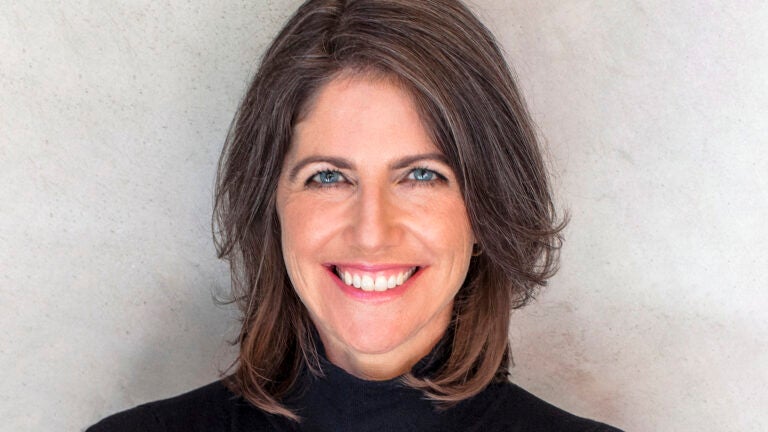
Christine Beckman says we should reimagine family and community, and value the joy of human connection. (Photo/Courtesy of Christine Beckman)
Q&A: COVID shook the scaffolding for working women, exposing need for better family policy
In Dreams of the Overworked, USC Professor Christine Beckman and her co-author examine what it means to live, work and parent in a world of increasing — and increasingly impossible — expectations.
For Women’s History Month, USC News caught up with Christine Beckman, the Price Family Chair in Social Innovation and professor at USC Price School of Public Policy, to discuss how the COVID-19 pandemic exposed the challenges many women and their families face in balancing work and home life.
Beckman will speak about her book at the Los Angeles Times Festival of Books, hosted by USC, at 10:30 a.m. April 23.
Dreams of the Overworked came out before the lockdowns and ongoing social distancing orders that went into effect during the COVID-19 pandemic, but the pandemic further exposed family and work pressures on women. How did you explore issues of work and family in this book?
One of the big concepts in our book is what we call “scaffolding.” It’s the social support and the infrastructure that parents build to help support their ability to work while also parenting. That involves extended family, neighbors, day care centers, schools, babysitters — the whole infrastructure that enables people to go to work and have their children cared for. That has always been an issue because schools end at 2:30 p.m. — if you’re lucky — and many of us work until at least 5 p.m. So, we have always needed this extra support outside of what school provides.
Then, the pandemic hit. Schools were closed, day care centers were closed, and grandparents couldn’t come to help with the kids because they were afraid of getting sick.
For the first time there seemed to be the hope that maybe now we’ll really be able to recognize that it does take a village.
I think all the stress that we saw parents — and particularly mothers — experiencing even before the pandemic was impossible to ignore once the pandemic hit. Suddenly, it felt like it was so visible and so clear. As a result, for the first time there seemed to be the hope that maybe now we’ll really be able to recognize that it does take a village. Without a village, that is a lot to put on individuals. This isn’t an individual issue. It’s a collective issue; it’s a societal issue. Yet we do such a poor job in the U.S. to manage it, relative to other countries.
This may be the moment where we start to recognize that we really do need to have a better infrastructure, a better set of supports. The fact that some women have had a strong negative reaction to the 2022 Women’s History Month themes of caring and hope might be because, “Yes, we’ve been holding it together — now, stop counting on us to do it.” I think women are asking, “Can we actually fix the system, so it doesn’t require this sort of selfless sacrifice?” Especially after two years of exhaustion, women are asking, “Can we actually have affordable child care? And could we have school days that are aligned with workdays? And how about parental leave?”
It’s frustrating to go back to this message of “women are great,” when what we want is movement on policies that would make people’s lives better.
Besides new and better federal policies, which may be challenging in the current political climate, what are local solutions or statewide solutions? For example, California has family leave to help mothers care for newborn or newly adopted children and keep their jobs.
California does have a family leave policy, which is great. Many states don’t. But I don’t think we’re quite done because it’s not just about passing a law. You have to examine it and see if people are actually using it. And if not, then why not? What are the constraints? For example, family leave only gives you a percentage of your salary. Here in California, there are a lot of people who are just getting by who really cannot afford to take that leave and it ends up benefiting higher-income people.
Policies always have unintended consequences. It’s one of the reasons I love being at this epicenter of social innovation here at the USC Price School of Public Policy. When you’re innovating new ideas, you have to experiment, you have to test, you have to iterate. You can’t just write a law and feel like you’re done. So even though we’ve got a great policy in California relative to other states, I think there’s still some work to be done to figure out how to make it be utilized better, because it’s not being used at the level that I think would be helpful to people.
What about private companies? What can they do to support mothers, caretakers and families?
There is certainly more organizations can do. In our book, we studied a company that was very interested in work life and family balance. They valued family and talked a really good game about that. But there were organizational pressures for people working more hours and helping the organization make more profits.
There’s this tension, even in organizations where they do want to support family. I think it’s a mistake for us to expect the organizations are going to be able to solve this problem, because they fundamentally have interests that are at odds with the interests of family. That doesn’t mean we should let them off the hook. But I don’t think we can rely solely on them.
I think it’s a mistake for us to expect the organizations are going to be able to solve this problem … That doesn’t mean we should let them off the hook. But I don’t think we can rely solely on them.
To that point, my co-author Melissa Mazmanian and I are looking at what we’re calling “time cascades.” Think about what happens if a conference call gets called for 8 a.m. on a Saturday morning. The time and resources that you need to put into getting either a babysitter or some other form of help in order to be there for that call means that organization is getting a lot of unpaid labor. Organizations need to be held more accountable for the help they’re getting from people they don’t employ. Currently, they don’t pay for it when they ask people to do things in these odd hours.
To provide an example: I remember when I was a junior faculty member and I had two kids who started school at 8:30 a.m. My husband was traveling a lot at the time, so school drop-off was my responsibility. Then, the dean’s office decided that the class I was teaching that usually started at 9 a.m. was now going to start at 8:30 a.m. You can see the conflict; the impossibility of being in two places at the same time.
I said I can’t do that; I’m going to start my class at 9 a.m. and I’m going to make up that half hour some other way. I managed to do that.
But one of the single moms we profiled in our book who had a time change at her job had to pay for an extra 2½ hours for child care every morning, not to mention all the hours she paid for after school. Organizations make demands without taking into account what it requires for employees to accommodate. Organizations should do better.
What has happened to the other institutions in American life that are part of the scaffolding of support for working families — such as community and faith organizations?
Other researchers have looked at “community mothering,” including in the African American community. Black women have always had to work. The idea that any mom could stay home with the kids was a short blip in white America, but it was never a reality for the African American community. There still are communities that rely very much on church and extended family and neighbors.
But the short answer to what has changed is that there’s been a lot of mobility in American life, with people moving to other cities and towns and away from a social support that we once had. In addition, the support we do have is underfunded, including schools and government. There is a cultural piece of this: U.S. culture is one of individualism, empowerment and entrepreneurship. And there are a lot of wonderful things about that set of values, but they also lead us to focus on individual solutions rather than collective solutions. I think that rhetoric has gotten even stronger in the last 40 years.
Has the COVID pandemic allowed us to get creative at solving some of these challenges? For example, some families got together and created learning pods when schools shut down. Is there something to learn from that experimentation?
The pods are interesting, with one caveat. If high-income people are the ones creating them and they end up replacing their public school with a home-schooling pod, that ends up increasing inequality. Solutions that are only adopted at the high end of the income bracket will make a lot of our problems worse.
Multigenerational support is incredibly helpful. Social support through pods and family are both terrific developments.
One big change during COVID was that people were working remotely and many younger people with kids who were living in expensive cities moved back to be near family. That multigenerational support is incredibly helpful. Social support through pods and family are both terrific developments.
I’m not convinced that the remote work will stick around. Some companies are being more rigid than I think is warranted given the great advantages of virtual work.
On the other hand, places like Silicon Valley have always produced innovations in work practices — like massage therapists, gyms and dry cleaners on-site and groceries delivered. It was all a way to make your life focused on work. As people have kids, why can’t these organizations consider paying for a house cleaner or child care and other resources that support families?
What are other sources of inspiration for creating better policies to support families?
If you look some European counties, the parental leave policies that are most effective at getting men to engage in this kind of caring work are where it’s a take-it-or-lose-it policy for parental leave. Families can get an extra four weeks of parental leave, but only Dad can take it. Economically, families decide that Dad is going to take four weeks of leave, because otherwise we are just leaving money on the table. And that makes a big difference in terms of the competency that can develop. When both partners have that time for parental leave, it has a long tail in terms of the balance of labor in a household. Women would benefit from more balance in household labor.
This goes back to the same point we were talking about earlier around how policies are designed. It really matters. How would you design parental leave to have more gender equity? You might decide both parents are eligible and some leave is dedicated to each partner.
Is there anything you want to add about this topic, in the context of Women’s History Month?
I want to point out that a lot of my research has been on more privileged people where the problem is too much work. The other side of this is lower-paid shift work, where the work is unpredictable. There are rotating schedules that move around constantly, making it nearly impossible for parents to cover child care and other kinds of care. I think that the mental health toll of that kind of precarity and uncertainty on your work when you’re also having to create all that scaffolding on the back end is daunting. We need far better policies to help working families in these situations.
And finally, if I can say something that might be a little controversial: There are organizations that have a stake in keeping this tension with balancing work and home life a woman’s issue. Because if the only pushback is coming from women and it’swomen’s problem, we can focus on retaining women without actually fundamentally changing our structure of work.
The real problem is people don’t want to dedicate as much time to their work as is being asked of them. If we could shift the narrative to that — about the way we structure work and our expectations of work, rather than “women have multiple obligations and it’s hard for them to juggle” — I think we could make a lot more progress. We could make work, work better, for everybody.



